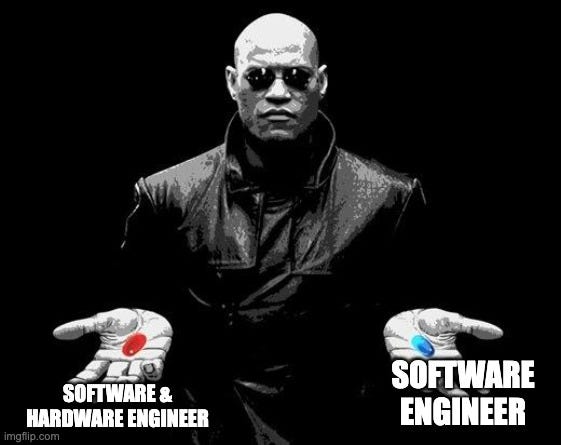Navigating the Shift from Software to Hardware in the AI Era
Why the Rise of AI Could Mean It's Time for Software Engineers to diversify Thier Skills Beyond the Digital
AI's Rise & The Shift Towards Hardware: Reskilling for the Future
Jensen Huang, the CEO and founder of Nvidia, has highlighted a pivotal change in the landscape of software development due to AI's expanding role, which could prompt many engineers to rethink their career paths. As AI progresses, automating an increasing array of tasks, the reality sets in that certain software engineering positions might become obsolete.
This realization is prompting software engineers to contemplate diversifying their skills towards hardware engineering—a domain brimming with creative and innovative potential, where human intuition and expertise are invaluable. This diversification doesn't mean abandoning software engineering altogether but enriching one’s skill set to include the gratifying process of creating tangible products. Such an expansion of skills not only offers the satisfaction derived from physical creation but also serves the lofty aim of tackling some of the planet's most pressing challenges. Therefore, enriching one’s portfolio with hardware skills presents a compelling path for those eager to leave a mark on the world, blending the joy of hands-on development with the ambition to devise solutions for critical global issues.
The real-world challenges of creating groundbreaking hardware
Elon Musk's adventures with Tesla and SpaceX aren't just tech success stories; they're real-world lessons in the gritty reality of creating hardware. Building something tangible isn't just about overcoming technical challenges; it's a full-on battle with logistical nightmares, regulatory hurdles, and financial tightropes. Hardware development is tricky because you're constantly wrestling with the real world, where even a tiny mistake can lead to massive setbacks.
Why Investing in Hardware Makes VCs Think Twice
Venture capitalists, the folks who could fund these dreams, are naturally cautious about diving into hardware. The main reason? Hardware requires loads of cash, takes ages to perfect, and there's no guarantee of quick returns. This cautiousness from investors means hardware innovators often struggle to get the financial backing they need, despite the potential for their creations to change the world.
Featured Engineering jobs
The Struggle to Fund Hardware Breakthroughs
Despite these challenges, hardware innovation is crucial. We're talking about creating solutions for huge issues like climate change and renewable energy. But, the reluctance from investors to put money into hardware projects means we're missing out on some potentially groundbreaking innovations.
Resilience and Vision: Navigating Hardware's Complexities with a Broad Skill Set
Embarking on projects in hardware, while continuing to leverage software expertise, presents its unique complexities. It's not solely about ideation but involves mastering the intricacies of investment, production, and market launch. Elon Musk's odyssey exemplifies the resilience and vision required to navigate these waters successfully.
For software engineers contemplating an expanded involvement in hardware, recognizing the full spectrum of what lies ahead is crucial. This journey, enriched by a diverse skill set, is marked by significant challenges but is equally laden with opportunities to forge a tangible impact. The approach should be one of preparedness, embracing the hurdles with a clear understanding of the goal to effect meaningful change.
The essence here is nuanced: While AI continues to redefine the landscape of software, the realm of hardware remains a testament to the undiminished value of human creativity and adaptability. For those inclined to broaden their professional horizons, integrating hardware-focused skills into their repertoire could prove as enriching as it is demanding.



